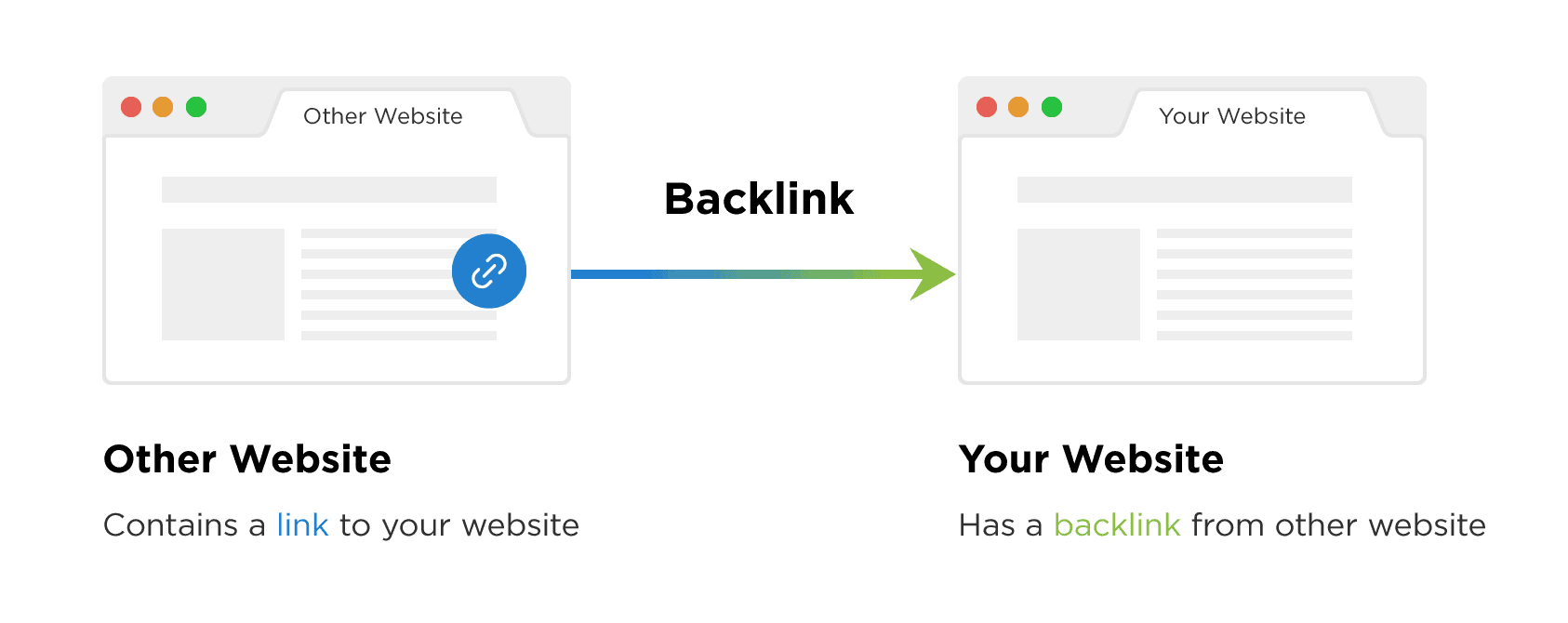Backlinks – they’re one of the most common topics we get asked about as an agency, and for good reason: they’re crucial for SEO. If you’ve been trying to improve your website’s SEO, chances are you’ve come across the term “backlinks” or “backlinking.” But what exactly are backlinks, and why do they matter so much?
Well, we understand that..backlinks can sometimes be somewhat of a difficult concept to grasp as a newbie, so that’s why we wrote this blog to simplify it!
Backlinks are a fundamental part of any SEO strategy. While choosing the right keywords, fixing technical issues, writing great content, they all play their part in your overall SEO effort, but backlinks should never be ignored. In fact, Google revealed that link building is one of the top three factors when it comes to search rankings.
Essentially, the aim of backlinks is to boost your site’s authority by reaching out to other similar websites to refer back to yours.
Are you ready to make that change and boost your website? Then keep reading!
What Are Backlinks?
At their core, backlinks are links from other websites that point back to your own—think of them as virtual word-of-mouth recommendations. They’re also called inbound links because they bring external traffic to your site. These links can come from various sources like blogs, news articles, or even other businesses sharing your content.

Backlinks help search engines like Google and Bing understand how popular and trustworthy your website is. Essentially, the more quality backlinks you have, the more search engines view your site as valuable. This directly impacts your rankings in search engine results pages (SERPs), making backlinks a key element in any successful SEO strategy.
The Evolution of Backlinks
In the past, the sheer number of backlinks determined how high a website would rank. But in 2012, Google’s Penguin update changed that, shifting the focus from quantity to quality. Backlinks are still essential, but the game has changed: high-quality, relevant backlinks from reputable sites carry much more weight.
When another site links to yours, it passes “link juice,” a kind of SEO value.
This value depends heavily on the domain authority of the site providing the backlink. For instance, a backlink from a high-authority site like The Sydney Morning Herald will pass more link juice than one from a small personal blog.
Across the internet, websites are given a domain authority score, which ranges between 1-100 (100 being the highest). This score is calculated based on multiple factors, one of them being how strong your backlink profile is. Therefore, when acquiring backlinks, a backlink from the Sydney Morning Herald, for instance, is going to pass on more link juice than getting one from a friend of yours’ blog, with all its 10 regular readers.
If you want to check the authority of a website, tools like MozBar (a free Chrome extension) can give you an idea of how much value a backlink from a particular site will carry.
But be careful—not all backlinks are helpful. Links from spammy or low-quality websites can harm your SEO, dragging down your rankings instead of boosting them.
Pro Tip: If you find toxic backlinks pointing to your site, you can use Google’s Disavow Tool to tell Google not to take those bad links into account.
Good vs. Bad Backlinks
Not all backlinks are created equal. A backlink from a low-authority, irrelevant site isn’t going to help much—and in some cases, it can even hurt your rankings. For example, spamming your URL across random forums or low-quality sites won’t do you any favours.
Good backlinks, on the other hand, come from trusted, relevant sites.
These could be from a mention in a national newspaper, a link from your Google Business Profile , or a feature on a popular blog in your industry.
High-quality backlinks improve both your SEO and your website’s credibility.
Why Are Backlinks So Important?
Backlinks are more than just links—they’re a vote of confidence for your website, helping search engines find and rank your site, improve its domain authority, and even drive traffic.
Boost Search Engine Visibility
Backlinks help search engines like Google discover your site. They act as signposts, showing search engines where to find your pages and signalling that your content is valuable. The more high-quality backlinks you have, the easier it is for search engines to find and index your site.
Increase Domain Authority
Google wants to rank sites that are trustworthy and authoritative. A strong backlink profile sends a signal to search engines that your content is worth promoting. But it’s not about the number of backlinks—it’s about the quality. A few high-quality backlinks can do more for your SEO than hundreds of low-quality ones.
Drive More Traffic to Your Site
Backlinks from reputable sites not only boost your SEO but also bring more direct traffic. The more people who visit your site from these links, the higher the chances that some of them will convert into paying customers or loyal readers.
Understanding Backlink Authority
When Google launched, its groundbreaking PageRank algorithm revolutionised how websites were ranked. It was one of the first search engines to factor in backlink popularity, meaning a page would rank higher based on the number of backlinks it had. However, it’s no longer just about quantity—Google now places significant weight on the authority of those backlinks.
Let’s break it down with a simple example:
- Page A has 1000 backlinks
- Page B has 10 backlinks
In theory, Page A should rank higher because it has more backlinks. But authority changes the equation.
If Page A’s backlinks come from low-quality or irrelevant sites, while Page B’s backlinks are from highly trusted, authoritative sources, Page B could easily outrank Page A.
This is why the quality of backlinks often matters more than the quantity.
PageRank assigns authority based on the number and strength of incoming links, meaning high-quality links from trusted domains carry more weight.
So, a single link from a well-known, reputable site can boost your authority more than dozens of links from lower-quality websites.
The Different Types of Backlinks
Not all backlinks are the same. Here are the main types you’ll come across:
- Dofollow Links
These are the most valuable backlinks because they pass on the most link juice, directly boosting your SEO. When you think of a traditional backlink, this is the one that comes to mind. - Nofollow Links
While these links still direct traffic to your site, they don’t pass as much link juice as dofollow links. Google will see the link but won’t necessarily use it to boost your ranking. - UGC (User-Generated Content) Links
These links appear in user-generated content, like comments or forum posts. They’re often flagged as user-created, meaning the website owner isn’t necessarily endorsing them. - Sponsored Links
A sponsored link indicates that a link is part of an advertisement, telling Google not to pass SEO value to the site it’s linking to.
How to Build Backlinks for Your Site
- Create Linkable Assets
To earn backlinks, you need to offer valuable content that people want to share. This could be well-researched blog posts, insightful infographics, or even tools that provide useful data. If you’re an established business, you likely already have content worth linking to, but if you’re just starting out, focus on creating high-quality, shareable content. - Leverage Pre-Existing Relationships
If you’re partnered with other businesses or selling someone else’s products, ask them for a backlink. It’s a great way to get started, especially if you already have a working relationship. - Turn Mentions into Links
If someone mentions your business but doesn’t include a link, reach out and ask them to add one. It’s a simple yet effective way to build your backlink profile. - Use Testimonials and Reviews
If you’re using a product or service that you love, offer to write a testimonial or review. Businesses love featuring customer feedback, and they’ll usually link back to your site as part of the review. - Pitch Content to Industry Blogs (Guest Posting) remains a standard and effective strategy for earning backlinks—if done right.
This involves writing and publishing content on someone else’s blog, but to make it work, your content needs to be niche-relevant, valuable to the publisher’s audience, and have strong SEO potential.
When done well, guest posting helps you secure high-quality backlinks, gain exposure to a new audience, and build authority in your industry.
- Digital PR has become an essential tool for building backlinks and boosting online brand recognition.
It involves sharing your story through press releases, guest articles, or creative campaigns designed to secure high-quality backlinks from authoritative sites. It’s no longer just a marketing strategy—it’s a key component of SEO.
Common types of digital PR include:
- Creative Campaigns: These are larger campaigns that use creative approaches—like games, in-person events, or viral stunts—to attract attention and generate backlinks.
- Reactive Campaigns: Jumping on breaking news or trending topics in your industry is a quick way to generate buzz and potentially land backlinks from media coverage.
- Data-Led Campaigns: These campaigns use unique data sources—like surveys or social media statistics—to create stories that journalists are likely to reference, leading to valuable backlinks.
- Expert Commentary: Journalists often need expert opinions to provide context or credibility to their stories. Providing this expertise can earn you backlinks from reputable sources, especially when engaging with platforms like HARO or Qwoted.
Quality and Relevance Matter
While backlink authority is important, relevance plays a key role too.
Google doesn’t just look at how many backlinks you have—it also evaluates how relevant those links are to your content.
A link from a site in your industry is going to carry more weight than one from a site in an unrelated field.
How We Can Help
Building a strong backlink profile can be challenging, especially if you’re not sure where to start.
That’s where we come in. Our team focuses on helping you acquire high-quality backlinks that actually move the needle—no spam or shortcuts, just reliable SEO strategies.
Ready to take your backlink profile to the next level?
Get in touch with us today, and let’s see how we can help boost your SEO!
